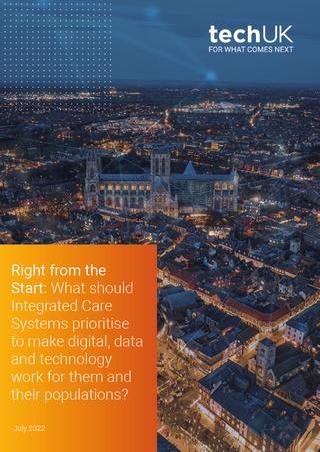Virgin Media O2 Business: Telemedicine – tomorrow’s technology, here today
Crisis has re-shaped our world. In the health service, the pandemic has been a catalyst for radical digital transformation. Almost overnight, the whole service, its systems and people came under a new immense pressure with an immediate need for more resources, temporary hospitals and alternative working practices, such as remote working.
The NHS had a long-term plan to digitalise services, but as the pandemic waves hit, immediate activation of the plan was needed. Regular financial restrictions and red tape were dissolved, allowing NHS organisations to invest in digital services that could mobilise and meet exceptional demand, maximise efficiency, and keep both patients and staff safer. Our study with the <Centre for Economics and Business Research (Cebr)> shows an acceleration of the rate of transformation by over four years in health and social care.
New digital solutions are ushering in a new era of possibilities.
Innovation that is critical for healthcare
Telemedicine can have a huge positive impact on health services. It gives Health Care Professionals the ability to diagnose and care remotely, which means invaluable time is freed up for those patients who need face-to-face care, minimising critical wait times and potentially saving lives.
Other technologies, such as sensor and smartphones, have resulted in radical and far-ranging improvements to healthcare outcomes. A positive response from patients reduces hospital admissions, again freeing up space for others. A few examples include using a smartphone to revolutionise the treatment of bowel disorders or monitoring inflammation in bowel disease via smartphone-based calprotectin testing.
These can keep clinical teams updated and a 40% reduction in hospital admissions, with a positive response from patients.
Graham Walsh, CCIO and knee surgeon at Calderdale and Huddersfield NHS Trust, described the extraordinary impact of digitalisation on treatment:
“With remote monitoring, I could be confident that we are progressing. The right care was going to the right patient.”
The vital signs that digital helps healthcare staff
Patient care improvements are a top priority, but this is supported by the wellbeing of staff who provide the services and are often pushed to their limits during busy times. With the introduction of hybrid working, more healthcare staff can work more efficiently, and reduced pressure means healthier working conditions and staff.
It is vital that clinicians have the latest, best and right technology for digital transformation to be effective. In order to cut unnecessary referrals, outpatient appointments and visits to A&E, tools need to be highly innovative and intuitive, with more data capture and less admin.
The importance of joined-up digital solutions
The whole health organisations’ infrastructure must be seamless and secure to support an integrated remote working from anywhere. If the system is to work to maximum effect, all key partners in the healthcare community need to onboard and have access to the right technology. Think care homes, palliative care providers and other services that may not, as yet, have access to the digital services they will require.
Choosing the right digital partner is vital
Critical to the success of any digital transformation is entrusting the process to a digital partner who not only understands your business and its complex needs, but also a partner take responsibility to ensure success.
You need the right tools and technology system to provide a unified experience. The experience to see the bigger picture and understand the small details that must be pulled together will ensure it happens to maximum effect. Moreover, your digital partner of choice needs to be invested in the healthy success of your transformation.
Choose wisely, knowing that success breeds success.
Check out our new podcast and ICS report
The techUK podcast: Innovation in place-based care
In this episode we explore the concept of ‘place’ in care, the principles behind it, the impact of Covid-19 on care delivery, prospects for innovation following the introduction of Integrated Care Systems, examples of industry best practice, and where listeners can go to learn more about ‘place’ and innovation in care.
We were joined by Helena Zaum (Social Care Lead at Microsoft and Chair of techUK’s Social Care Working Group), Scott Cain (Associate at the Connected Places Catapult) and Hannah Groombridge (Healthcare Engagement Manager at Person Centred Software).
This discussion forms part of techUK’s Digital Place Week 2022 activity and features on our recently-launched Social Care Innovation Hub.

Read techUK's latest flagship report, released on Thursday's 'Health and Wellbeing' day:
Right from the start: What should Integrated Care Systems prioritise to make digital, data and technology work for them and their populations?


